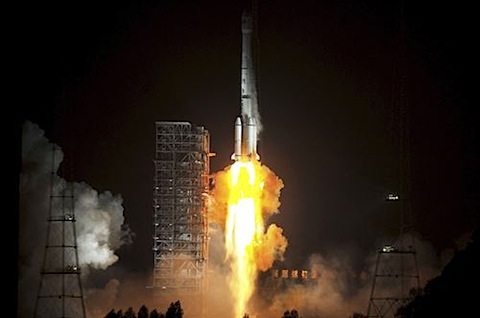
A Chinese rocket carries the Bolivian satellite, Tupac Katari, into space. And without the help of the Chinese, it’s hard to imagine Bolivia ever getting such a thing off the ground. But they did, and the fact that they did is no thanks to the usual suspects…who, as is their wont, seem to have interfered even here, if what Evo says is true:
Evo Morales announced that he would reveal a “secret” that he “had kept for a long time” in order to put a stop to the “blackmail” by the United States of other countries when it comes to transference of technology.
Morales explained that during the construction of the satellite “Tupac Katari”, China informed Bolivia that, despite signed agreements for technological co-operation with the United States, the US had refused to supply the necessary components for the communications satellite.
“They told us that the US did not want to sell or transfer technology to Bolivia, so we (referring to himself and vice-president Álvaro García Linera) asked ourselves: Now what are we going to do?” Morales said, according to the Bolivian newspaper La Razón.
The Bolivian leader says they decided to take the problem to China, where Tupac Katari was being built. “We told them that they had to give it to us because there was a commitment, but what confidence could Bolivia have in China?
“I don’t know what agreements China has with the United States, but they informed us that they had not completed our communications satellite with US technology, but with French,” Morales concluded.
Morales considers that Washington must be boycotting La Paz, because “if the satellite had been for Chile, Argentina, Brazil, Colombia or other countries, there would not have been any US veto” on selling the technology.
The Bolivian government has already begun designing a project to build a prospecting satellite for natural resources, and has planned to launch a second one for communications, following the success of last December’s launch of Tupac Katari, according to an official source today.
Speaking to the EFE press agency, Iván Zambrana, the director of the Bolivian Space Agency (ABE), emphasized that the Tupac Katari satellite project has been both a commercial and a technical success.
He noted that the launch was “near-perfect” and that later tests demonstrated that the satellite had reached “100 percent of its capacities in orbit and is functioning according to the specifications of its design.”
As for its commercial side, Zambrana noted that its success is “greater” than initially expected, since it was calculated that in the first year it would take up a third of the satellite, but is now using “almost half”.
“This indicates to us that it will reach full capacity in maybe two or three years, and we have to think of a second communications satellite, alongside the project of an observation satellite which is already planned for this year,” said the ABE director.
He added that the project is expected to be completed “on paper” by the end of this year, so that next year negotiations can begin to get the second Bolivian satellite plan off the ground.
Bolivian authorities want the new satellite to be used for natural-resources exploration. It will be operated by the ABE and the data generated will be turned over to those specialized in processing them.
According to Zambrana, it is expected that construction will begin in 2016 or early 207, with an eye to putting it in orbit within three or four years.
As the project is still in the design phase, there is no cost estimate as yet, but ABE figures that it will be “less than 100 million US dollars.” The Tupac Katari (TKSAT-1) project cost $300 million.
Nor has it yet been decided which country will be in charge of building the satellite, since “there are not many” who have the capacity to build such devices.
“Obviously China is already a partner we have had, and with whom things have gone very well for us, but there are also countries such as France and Russia who traditionally have a great space culture, and even the United States,” said Zambrana.
At the moment, the Tupac Katari satellite has contracted its services to the state-run Bolivian Telecommunications Company (ENTEL), and Bolivia TV, and the private telephone company Viva. There are also negotiations with ten other entities, among them TV channels, oil companies, and state organisms, all interested in using the services of TKSAT-1.
Translation mine.
What? The US is conspiring to keep South American countries poor and backward, the better to trick, blackmail and exploit them? I’m shocked. SHOCKED, I tell you!




It is kind of hard to believe considering Bolivia under Morales has gotten millions upon millions of dollars in economic and military aid in training and weapons to the tune of over $606,907,550.00.
But then again that’s the “anti imperialism” we see in the age of revisionism and 21st Century so called socialism.
http://justf.org/Country?country=Bolivia&year1=2006&year2=2015&funding=All+Programs&x=55&y=6
606 mill over A drop in the Bucket when you compare to countries like Colombia or Peru which have the same narcotics issue. weapons sales are a pittance really, most of its weapons are donated outdated relics.